Greece's million unpaid workers
- Published
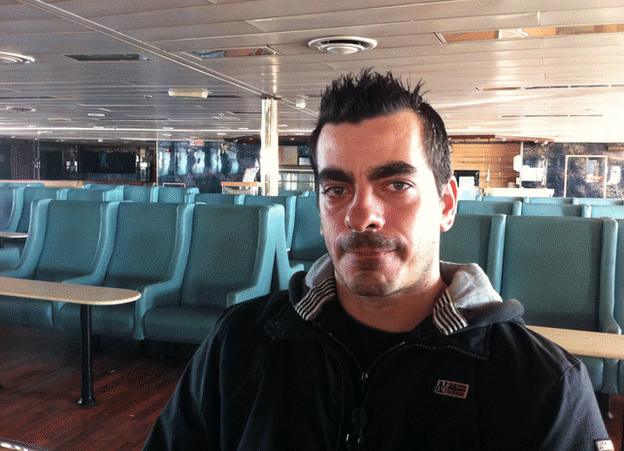
Antonis Giakoumatos: "I feel like I'm waiting to die."
She stands idle, tied ashore, her hull slowly rusting.
The Penelope should make a daily crossing from the port of Rafina, outside Athens, to the beautiful islands of Andros, Tinos and Mykonos. But since the summer, she has been stuck, the crew refusing to sail as they have not been paid for months on end.
The ship is named after the wife of the ancient Greek figure Odysseus. She is said to have waited patiently for his return from the Trojan war. But the patience of these workers is fast running out.
Around 20 have occupied the boat, living on board for fear of losing their jobs altogether if they abandon ship. And so they stay on a deserted shell with no electricity or running water, the kitchens dark and closed up, passenger lounges with rows of vacant seats.
In one corridor, a sign proudly reads: "Your perfect holiday starts here". The irony is not lost on the desperate workers.
"The situation here is very difficult," says Antonis Giakoumatos, the first officer. "We stay in a ghost ship. I feel very sad and angry because I don't have the money to go and see my wife and children."
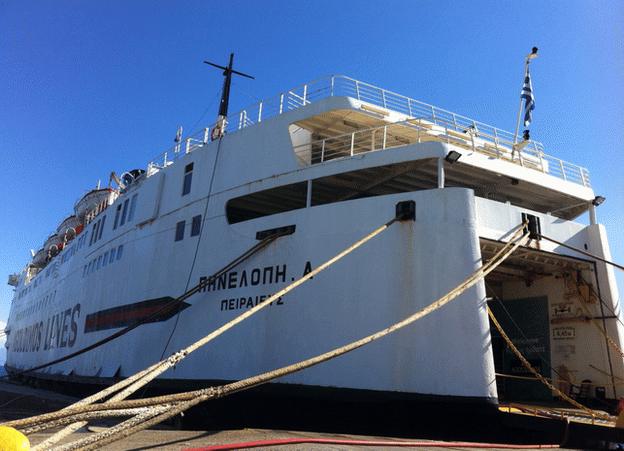
The Penelope's crew have not been paid for months
I ask what the atmosphere was like on board when the ship sailed.
"It was very good. I would see the passengers' smiles and know I was doing my job well. Now it's empty. I feel like I'm waiting to die here."
The crew - and the BBC - have tried to contact the company, Agoudimos Lines, but to no avail. The assumption is that it is in financial trouble and so is withholding salaries, confident that workers would rather this than have no job at all.
Knock-on effect
The employees of the Penelope are some of the one million private sector workers in Greece who go unpaid. The Labour Institute of the Confederation of Greek Workers (GSEE) found this week that one in every two companies was not paying its staff on time.
Much of the focus in Greece's financial crisis has been on public sector cuts but this is the other side of the story - private companies crumbling from a drop in demand. And Platon Tinios, an economist at the University of Piraeus, says the two are linked.
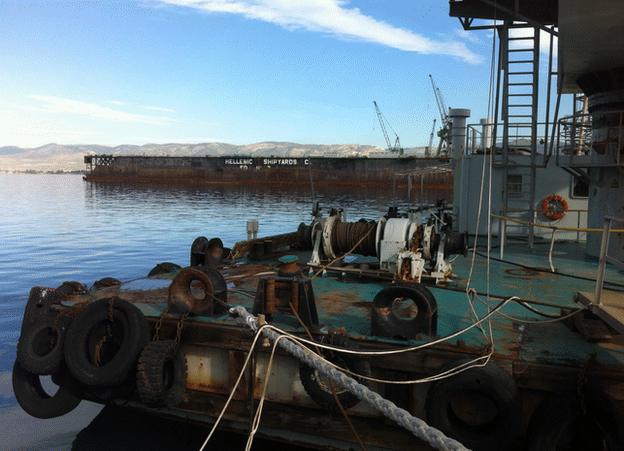
Workers at the Hellenic Shipyards have not been paid in over a year
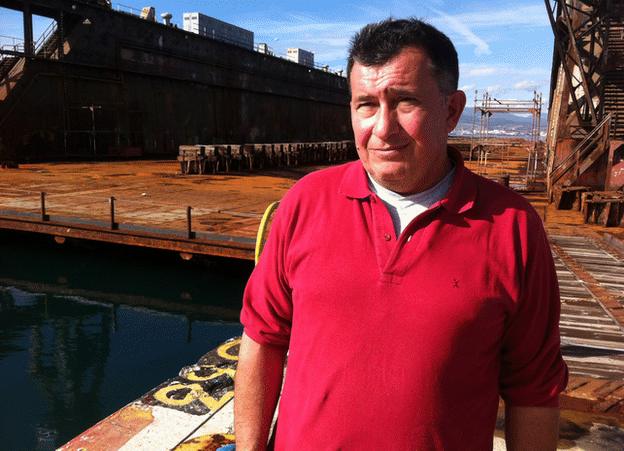
Shipyard worker Kostas Hatzopoulos says he is surviving on loans and handouts
"The public sector is exporting its problems to the private sector," he says. "When the state is squeezed - as it has been frequently - the easiest thing is to postpone payment to suppliers. Hence a liquidity problem in the private sector."
Can the Greek economy ever achieve robust growth after years of recession if the private sector is hobbled in this way, I ask?
"I don't think so," he replies. "But there's another problem: banks have stopped lending or, when they do so, it's at very high interest rates. So companies try to economise where they can, and delaying payments to workers is the easiest form of finance."
Across Athens at the Hellenic Shipyards, it is an even worse story. The 1,200 workers have not been paid since April 2012. The cranes are halted, vast floating docks lie rusting in the water - one of Greece's key industries paralysed.
"It's been my job for 33 years," says Kostas Hatzopoulos as he looks out at the old machinery.
"It was my life, my experience, my technical knowledge. Now I've had to survive by borrowing money from friends and asking for food from the Church."
Here, it is partly corruption to blame. The shipyard was previously owned by a German company, HDW, now part of ThyssenKrupp.
In 2000, the Greek government signed a murky contract to pay the owner to build and modernise Greek naval submarines at the shipyard. The cost - at almost 3bn euros (£2.5bn; $4bn) - was hidden from Greece's deficit figures so the country could join the eurozone.
Company tactic?
Since then, the defence minister involved, Akis Tzochatsopoulos, has been jailed for taking kickbacks on the deal.
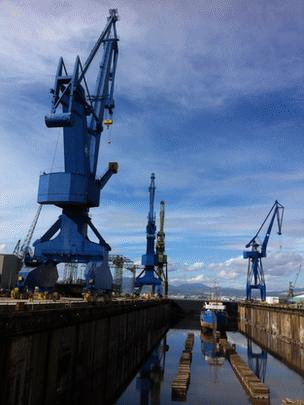
The cranes at the Hellenic Shipyards rest idle
In 2010, a majority stake in the shipyard was bought by Abu Dhabi Mar, an Emirati company, expecting payments for the order to be honoured.
But with the financial crisis, Greece's formerly vast defence budget - its military spending was the highest in the EU, as a proportion of GDP - was cut down to size.
Now the contract has not been paid and so the company has withheld salaries. Abu Dhabi Mar refused to talk, as did Greece's ministry of defence, but a coalition MP, Makis Voridis, insists the firm has reneged on its obligations.
"They haven't done the work they're meant to be doing and so the state will not pay," he says.
"I think they're using the social problem of leaving workers unpaid to push the state to give money that is not owed. We must solve the problem but in a way that respects taxpayers' money."
Regular protests by the shipyard workers have failed to break the deadlock but they are just some among so many now, deprived of the safety net of a stable job.
Greece already has record unemployment of over 27% but that does not include the million or so unpaid workers.
It is a story you simply would not expect to hear in a European Union country in 2013. But then, in today's Greece, there is just so much that shocks.